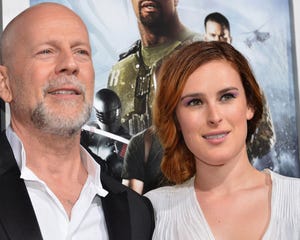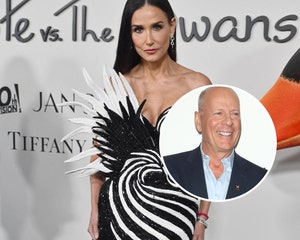“It’s ok to be in the middle of the messy and not totally have it all sorted yet,” wrote the 30-year-old daughter of Bruce Willis and Demi Moore, who has previously been open about her struggles with anorexia and body dysmorphic disorder.
Tallulah Willis is sharing an honest update about her eating disorder recovery.
On Wednesday, the actress — who has been open about her struggles with an eating disorder and body dysmorphic disorder (BDD) in the past — took to Instagram to get candid with her followers about an “intense moment of romanticizing unhealthy times” amid her recovery journey, and shared a touching message to others who may be experiencing similar struggles.
Getty
Demi Moore Shares Advice for Families Dealing With Dementia Amid Bruce Willis’ Diagnosis
View Story
Alongside a series of photos of herself as a child, Tallulah, who is the daughter of Bruce Willis and Demi Moore, wrote, “ED recovery babies – sending love to you all, I’m having an intens[e] moment of romanticizing unhealthy times and how it felt to move through the day in that size body. Just wanted to voice it because I know (hope) I’m not alone.”
“This little raggymuffin is so special and it’s strange to know that and want to give her abundance and vitality – LIFE!” she added. “whilst at the EXACT same moment feeling pulled by an old desire, deep down from the pit spot in your belly, to compare to the ‘better’ version of me. AND it’s ok to be in the middle of the messy and not totally have it all sorted yet. 🫛🌾☀️.”
The 30-year-old’s friends and fans took to the comments section to applaud her opening up about her ED recovery.
“You are magic, your truth is so vital and I’m so lucky to be your sister,” her older sister, Rumer Willis, wrote.
Waiting for your permission to load the Instagram Media.
Model Helena Christensen added, “You’re so wise and beautiful inside out.”
Ewan McGregor’s daughter, Esther-Rose, also chimed in, writing, “🙏🏻 thank you for this. Truly a thought that consumes more people than we know. ❤️.”
Meanwhile, a fan wrote, “‘moving through the world in a certain sized body’ hit. 21 years of recovery, and slips, and this is still IT. Honoring you. And me. And all of us moving through this world in our bodies every damn day.”
“The most tender. Your vulnerability and your strength help, heal, and hold others up. You are of so much value to this world!” a second user commented, while another said, “you are a magical being and I so appreciate your vulnerability and honesty.”
Tallulah has detailed her battles with mental health over the years, including her struggles with anorexia nervosa and body dysmorphic disorder.
In a heartbreaking and insightful essay she wrote for Vogue last year, she opened up about her own mental health struggles growing up in the “long shadows” of her famous parents, and about her dad Bruce Willis and his battle with dementia.

Getty
Rumer Willis Says She’s ‘Really Missing’ Dad Bruce Willis Amid Dementia Battle
View Story
Tallulah shared how the internet impacted her self-image at the age of 11 and set her on a collision course with personal challenges throughout her life, including anorexia.
She described how her own struggles with mental health complicated and often impeded her own ability to confront what was truly going on with her father, writing that it was a kind of “avoidance and denial that I’m not proud of.”
During this time she was battling anorexia and said, “By the spring of 2022, I weighed about 84 pounds.”
She also said mourning the loss of her father as a protector in the thick of her battle with anorexia. “What if my dad had been his full self and saw me at that size? What would he have done?” she asked in the essay.
“I’d like to think that he wouldn’t have let it happen. Whereas my sisters and my mother have these extensive tool kits — lots of psycho-education and interpersonal skills — my dad has never been so interested in root causes, in close examination. Maybe he’s a stereotypical father of a certain generation in that way, a doer who, if he had understood, might have scooped me up and said, ‘This is ending now,'” she contemplated.
She then got treatment, after her family stepped in, and learned of a new diagnosis: borderline personality disorder. With new tools from treatment she was able to get back to a healthy weight and began to confront what was going on with her father.
If you or someone you know is struggling with an eating disorder, get help. Contact the National Eating Disorders Association (NEDA) at 1-800-931-2237 or go to NationalEatingDisorders.org.


